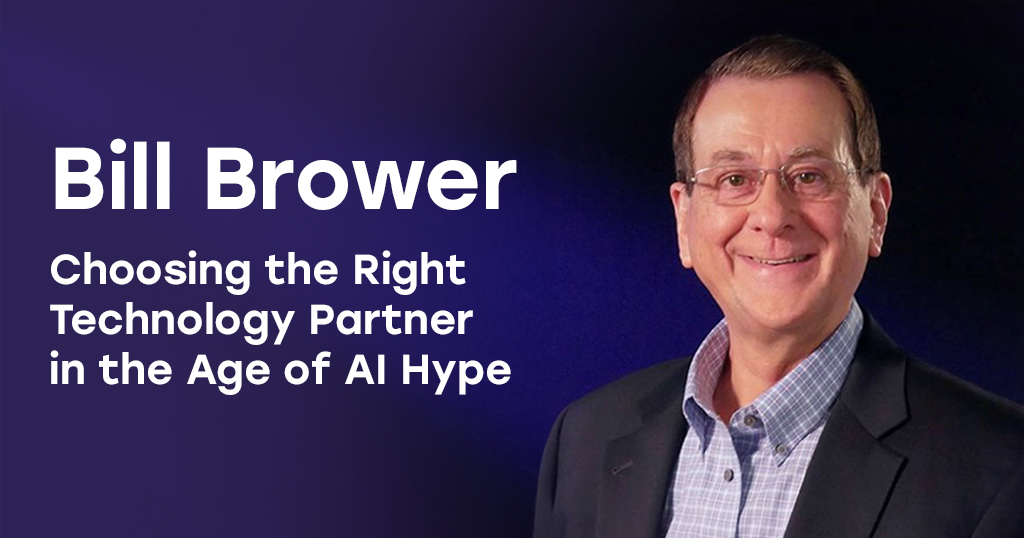September 29, 2025 / by Bill Brower
Choosing the Right Technology Partner in the Age of AI Hype

By Bill Brower, Senior Vice President of Industry Relations and Claims Performance, Solera
With more than 30 years of insurance and automotive claims experience, including senior leadership roles at Liberty Mutual, Nationwide, and LexisNexis Risk Solutions, I’ve seen technology promises come and go. Today, as Senior Vice President of Industry Relations and Claims Performance at Solera, I work with insurers worldwide to improve claims efficiency, accuracy, and customer satisfaction.
What I’ve learned is simple: in times of rapid innovation, the industry must balance opportunity with caution. Artificial Intelligence is transforming claims management, but it has also created a surge of vendors offering “AI-powered” solutions that look impressive in a demo yet fail to deliver at scale. For insurers, the wrong choice doesn’t just waste budget, it can disrupt operations, erode customer trust, and create regulatory exposure.
At Solera, we’ve spent decades building and refining Vehicle Claims solutions that deliver measurable results globally. Here are four principles insurers should use to separate hype from proven value when choosing a technology partner.
1. Demand Evidence of Scale and Track Record
A flashy presentation is not a proof point. Insurers should insist on clear metrics:
- How many claims does the technology process in production environments?
- What are the quantifiable results: cycle time, indemnity accuracy, policyholder satisfaction?
- Has it been stress-tested in different geographies and regulatory frameworks?
Solera’s difference: Our Vehicle Claims platform processes millions of claims annually across more than 120 countries, built on over four decades of experience serving insurers globally.
2. Look Beyond “AI-Powered” Labels
Many vendors market AI as a magic wand. Insurers need to push for clarity:
- Where in the workflow is AI actually applied: triage, damage detection, estimate generation?
- What is the size and quality of the training data?
- How is accuracy validated, and what controls exist for outliers?
Solera’s difference: Our AI is trained on billions of proprietary images and refined by decades of claims and repair expertise. We deploy hybrid workflows where AI accelerates accuracy and speed, but human oversight ensures compliance and safety.
3. Assess Integration Into the Full Claims Ecosystem
Technology that lives in isolation creates friction instead of value. Ask vendors:
- Can it connect seamlessly to your core claims management system, repair networks, and supply chains?
- Does it adapt to your regulatory environment?
- What deployment, training, and change management support is provided?
Solera’s difference: Vehicle Claims is designed as an end-to-end platform, from FNOL through settlement, integrating across insurer operations and the repair ecosystem to minimize disruption.
4. Evaluate Risk, Compliance, and Long-Term Viability
A vendor relationship should be assessed not just for features, but for durability and risk. Key questions include:
- Who owns the data, and how is privacy safeguarded?
- How is compliance maintained with OEM standards, total loss rules, and parts legislation?
- Is the vendor financially stable and equipped to support insurers for the next decade?
Solera’s difference: With a global footprint, long-standing insurer partnerships, and a reputation for compliance, Solera offers insurers confidence that their technology partner will stand the test of time.
The Bottom Line for Insurers
For decision makers in insurance, technology partnerships must be grounded in scale, integration, risk management, and longevity—not just AI hype.
At Solera, we’ve seen too many “next big things” collapse under the weight of real-world complexity. That’s why our Vehicle Claims solutions are built on decades of proven delivery, trusted globally by insurers who need more than promises. In an era of hype, insurers deserve technology partners who are real, and who deliver.
